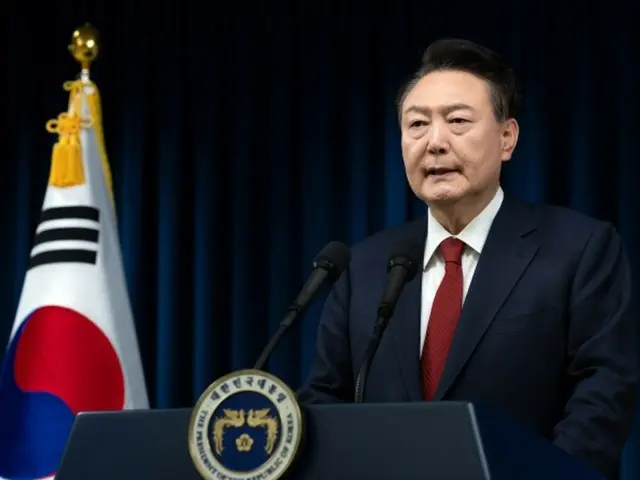Various problems have arisen that threaten the lives of citizens, including noise, trash left by participants, and traffic congestion. The Korean newspaper Chosun Ilbo reported that a pile of cups had been piled high in front of a convenience store near the site of the rally.
The serious situation was reported along with photos of noodle containers. Yoon declared "emergency martial law" late at night on the 3rd of last month. Emergency martial law is a type of martial law stipulated in the Korean Constitution.
A state of emergency is issued by the President in the event of military necessity or to maintain public order. The military takes control of administrative and judicial functions and is permitted to restrict freedom of speech, publication, and association.
This was the first time that martial law had been declared since democratization in 1987. Following the declaration, armed martial law soldiers broke the windows and stormed into the National Assembly building. The situation was reminiscent of the military junta era, and the National Assembly
Many citizens gathered in front of the building, shouting slogans against martial law and surrounding military vehicles, causing chaos. However, martial law can only be lifted if a majority of members of the National Assembly request it.
The National Assembly had to comply with this, and immediately after the declaration, a plenary session was held in which all members in attendance voted in favor of lifting the state of emergency. Yoon lifted the state of emergency after just six hours.
Opposition parties including the Democratic Party of Korea have accused Yoon of "attempting to suspend the constitutional order and seizing permanent power through an attempted civil war."
The National Assembly submitted a motion to impeach Yoon, pointing out that he violated the Constitution by "bringing the president to power." The motion was voted on the 14th of last month, and passed with 204 votes in favor and 85 against. As a result, Yoon was suspended from his duties.
Currently, Deputy Prime Minister for Economic Affairs and Minister of Strategy and Finance Choi Sang-mok is acting as president. The opposition party has also accused Yoon of declaring emergency law as an act of civil unrest.
A joint investigation headquarters consisting of the Public Officials Investigation Agency (PPA) and other agencies is currently investigating. On the 3rd of this month, the joint investigation headquarters entered the presidential residence to execute an arrest warrant for Yoon. However,
However, the Presidential Security Service blocked this, and after a standoff that lasted more than five hours, the investigation headquarters eventually gave up on carrying out the execution that day.
The Joint Investigation Headquarters re-requested a warrant from the court, which was granted on the 7th.
Yoon's legal team argues that the arrest warrant is invalid because the Joint Investigation Headquarters does not have the authority to investigate.
Rallies have been held by supporters and opponents of his arrest and impeachment, and have become particularly large every weekend. In the midst of these rallies, trash left by rally participants, noise pollution, and traffic congestion have become serious problems.
It has become a problem for citizens. According to the Chosun Ilbo, a clerk at a convenience store near the rally site told the paper, "Because of the demonstrations, the amount of garbage has increased by 20 times compared to normal.
"Some people sit at tables and drink a lot of alcohol," he said. According to Seoul City, the average amount of garbage collected in Yongsan-gu, where Hannam-dong is located, has risen to 593 tons a day since large-scale rallies began.
The amount of water has increased to 610 tons. A resident living nearby lamented in an interview with the newspaper, "They shout on loudspeakers until 11pm, so I can't get a break."
According to Ily, one of the spectators at a musical performance venue near the presidential residence told the media, "I knew there was a rally near the venue, but I didn't know there was a single lane of road.
"I didn't know that the rally could be held without permission," he said, and added, "I would like the rally to be managed so as not to affect vehicular traffic."
In response to the situation, the Seoul Metropolitan Government has instructed police stations in charge of censoring all-night demonstrations and street protests that are not subject to prior notification.
Regarding the act of occupying the entire area, we have written a request to take measures such as making sure that the assembly time is adhered to. In addition, as traffic congestion is occurring, we are cooperating with the National Police Agency and transportation management agencies to detour city buses.
The city government decided to take measures such as operating trains at designated times and having subways pass through stations near the scene. According to Yonhap News, a city official said, "We are concerned about the safety of elementary and middle school students who are going to and from nearby schools.
"Safety is also being threatened," he said, calling on relevant agencies to take proactive measures to prevent harm to ordinary citizens.
2025/01/14 10:31 KST
Copyrights(C)wowkorea.jp 5

